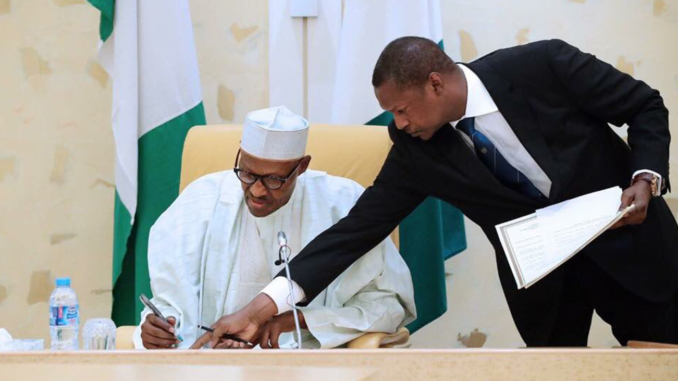
It is now an offence for hospitals to deny gunshot victims treatment in the country with President Muhammadu Buhari’s assent to a bill earlier passed by the National Assembly to this effect. The Compulsory Treatment and Care for Victims of Gunshots Act, 2017, which came into effect on the eve of 2018, ensures that no police report is needed by any medical facility to admit a victim. The law is a welcome development and underscores the sanctity of life.
Before now, people with such wounds were routinely rejected by hospitals because of the tendency of the police to harass and incriminate medical doctors and other medical personnel for treating them without obtaining clearance. The erroneous assumption by the police was that every gunshot victim might have been an armed robber, who escaped from the fusillade of their bullets.
According to the Senior Special Assistant to the President on National Assembly Matters, Ita Enang, both public and private hospitals are involved in the implementation of the law; and a victim should be given immediate and adequate treatment whether there is a cash deposit or not. He said, “Further, a person with gunshot wound shall not be subjected to inhuman and degrading treatment or torture by any person or authority, including the police and other security agencies.”
It is a harrowing experience for families to lose their loved ones under such cold-blooded circumstances. One of such cases involved the late Bayo Ohu of The Guardian, who was shot in his Lagos home in 2009 by suspected assassins. The first hospital refused to admit him. By the time he was taken to a public hospital, he was pronounced dead. The death of Saka Saula, a former chairman of the National Union of Road Transport Workers, Lagos State chapter, followed the same pattern in 2008.
A former Inspector-General of Police, Solomon Arase, had to re-issue a statement on this matter in 2015, which charged his officers not to harass Nigerians and good Samaritans in this regard, just as he reminded doctors that they were “equally duty bound to treat victims’ wounds and further inform police of relevant facts.” Unfortunately, this never changed anything. It was why Christopher Ojiaka died in Port Harcourt in November 2017, after two hospitals refused to admit him, following gunshot injuries at a bank ATM.
The hospitals’ rejection of emergency cases of this nature verges on the abuse of the most important fundamental human right – the right to life, enshrined in Section 33 (1) of the 1999 Constitution. No one, the constitution emphasises, shall be deprived of it, save in the execution of capital offence, for which the person had been found guilty by the court.
What seems obvious is the fact that the fear of police harassment is not the only obstacle to the enforcement of this life-saving law, but the profit motive of hospitals. As an emergency, the victim or the Good Samaritan that may rush him/her to a health facility may not have any ready cash to deposit. This is a disincentive that readily comes into play. For this reason, an elaborate public enlightenment on the details of the Gunshot Act is imperative, especially on the penalties for its violation by hospitals, doctors, nurses and the police.
By doing so, the law will not be like any other legal instrument in the country, which is observed in the breach. In fact, if our society had been one of law and order, a new law to compel hospitals to save life under an emergency situation would have been needless. Apart from the constitution, The National Health Act 2014 had made a provision for this. In Section 20, it states partly: “A health care provider, health worker or health establishment shall not refuse a person on emergency medical treatment for any reason. An offender is liable to a fine of N100,000, a jail term of six months or both upon conviction.”
Consequently, all Nigerians should be abreast of these laws, so that legal remedies could be sought against individuals and institutions whose actions might lead to avoidable deaths under these gruesome circumstances of gun shots. Many doctors have forgotten their Hippocratic Oath; and they need to be reminded of it through legal sanctions.
The police are naïve to think that anybody with gunshot injuries is an armed robber, with the proliferation of arms in the country. This is against the background of the official report which says that 70 per cent of illicit weapons in West Africa circulate here. What is more, the Boko Haram crisis in the North-East, militancy in the Niger Delta region, Fulani herdsmen terrorism, armed robbery, kidnapping, gunfights between rival cult groups and police stray bullets quite often produce an army of gunshots victims. In 2015 alone, police records showed that 2,241 robbery cases occurred; in 2014, there were 2,841 cases and 2,988 in 2013. For these three years, the number of victims that might have been left to die from untreated gunshot wounds is better imagined.
Human life in Nigeria should be valued the way it is done in civilised societies. For instance, in the wake of the upsurge in knife and gun violence in the United Kingdom, civil rights activists and the police in 2007 demanded an attitudinal change to official response to emergencies. “The patient should remain the medical team’s prime concern at all times and the police’s arrival should not be allowed to delay or hamper treatment or compromise the patient’s recovery. The healthcare team and the police must abide by this decision,” said the UK General Medical Council then.
The attitude of the Nigeria Medical Association should not be different. Save life first; that is the ultimate message.
END

Be the first to comment